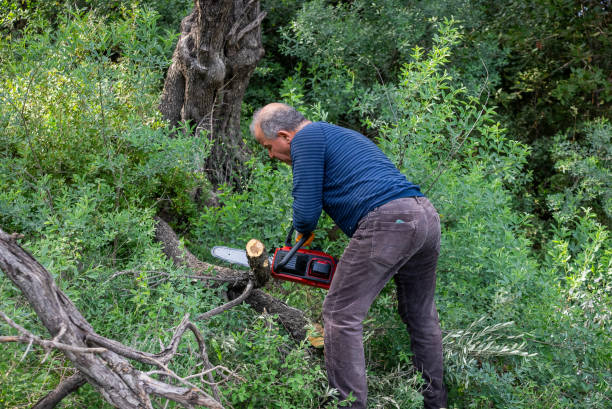When hiring a reliable tree company in your area, verifying their credentials and licenses is crucial. You don’t want to risk hiring a company that isn’t certified by recognized organizations or lacks proper insurance coverage. Checking customer reviews on Google and Yelp can also give you a sense of their reputation, but that’s just the beginning. What about their safety practices? Do they follow OSHA guidelines and ensure their workers are well-trained? Understanding these factors can help you make an informed decision, but there’s more to consider.
Verify Credentials and Licenses
When choosing a tree company, verifying their credentials and licenses is crucial to ensure you’re hiring qualified professionals. You want to avoid risking the safety of your property or loved ones by hiring an unqualified team. Start by asking if they’re certified by a recognized organization like the International Society of Arboriculture (ISA). This certification indicates they’ve undergone rigorous training and adhere to industry standards.
Next, check if the company holds the licenses your state or local government requires. Licensed tree companies are more likely to comply with local regulations and safety standards. You should also confirm they carry adequate liability and worker’s compensation insurance. This protects you from potential financial burdens in case of accidents or damages.
Additionally, inquire about the company’s experience and track record. A company with several years of experience has the expertise for various tree-related tasks. Feel free to ask for references or examples of past work. This helps you gauge their reliability and professionalism.
These steps ensure you entrust your tree care needs to a competent and trustworthy company, safeguarding your investment and peace of mind.
Evaluate Reviews and Testimonials
After verifying credentials and licenses, the next step in choosing a reliable tree company is to evaluate reviews and testimonials. These can give you insight into the company’s reliability, customer service, and quality of work. Check online platforms like Google, Yelp, and Angie’s List. Look for consistent patterns in the reviews. Are there repeated complaints or praises? A company with a majority of positive reviews and a few negatives is typical, but numerous negative reviews are a red flag.
Don’t just rely on star ratings; read the actual comments. Detailed reviews often highlight specific experiences, whether good or bad. Pay attention to how the company responds to negative reviews. A professional, courteous response indicates they care about their reputation and customer satisfaction.
Additionally, ask the company for references. Contact past clients and inquire about their experiences. Were they satisfied with the service? Was the job completed on time? Would they hire the company again?
Lastly, use social media. Platforms like Facebook and Twitter can provide real-time feedback and interactions. This comprehensive approach will help you get a well-rounded view of the tree company’s reliability.
Assess Insurance and Safety Practices
Ensuring a tree company has proper insurance and adheres to strict safety practices is crucial for protecting your property and liability. Start by asking for proof of insurance. A reliable tree company should have both liability insurance and workers’ compensation. Liability insurance covers any damage to your property, while workers’ compensation protects you if a worker gets injured. Don’t just take their word for it; ask to see their certificates and verify their validity with the insurance provider.
Safety is equally important. Inquire about the company’s safety protocols. Do they follow OSHA guidelines? Are their workers trained and certified? A professional tree company invests in safety training for its staff and ensures they use personal protective equipment (PPE) like helmets, gloves, and harnesses. Check if they conduct regular safety meetings and equipment inspections.
Also, ask if the company has a written safety plan. This document should outline their procedures for handling various scenarios, ensuring they’re prepared for any situation. By thoroughly assessing a tree company’s insurance and safety practices, you’ll safeguard your property and provide a smooth, worry-free experience.

